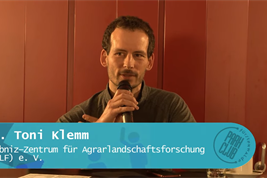29.04.2024

On Sunday, April 28, 2024, the first event of the series #waehlengehen24 took place at the Parkclub. Instead of the usual format where the candidates for the respective political committees have their say, the Parkclub, together with the Fürstenwalde office, invited scientists to speak. The event was streamed live and can also be watched on YouTube.
There are four elections to be held this year, on two different dates. On June 9, all eligible voters will have the opportunity to elect their representatives to the European Parliament, the Oder-Spree County Council, and the Fürstenwalde City Council. On September 22, voters will decide on the composition of the Brandenburg state parliament. With the format #waehlengehen24, the Parkclub Fürstenwalde together with the Fürstenwalde coordination office of the federal program Demokratie leben, which is funded by the Landeszentrale für politische Bildung Brandenburg, presents a total of five live events. The aim of this special series of events is to give participants a better understanding of parliamentary democracy and to inform them about political issues in the run-up to the upcoming elections.
The kick-off of #waehlengehen24 took place on April 28 as a special "Science" edition. Guests were Dr. Toni Klemm from the Leibniz Centre for Agricultural Landscape Research (ZALF) and Prof. Dr. Ralf Kohlen from the University of Applied Sciences Wildau. Moderated by Henrik Dudek, head of the Parkclub Fürstenwalde and a graduate of the European University Viadrina, the two spoke for almost two hours about their research, science in Brandenburg and their views on future political challenges in the region.
As an expert in traffic management, Prof. Dr. Ralf Kohlen provided insights into mobility research at the Technical University and advocated looking at traffic as a whole system with many different components and at the mobility needs of road users. In response to a participant's question about pedestrian zones, he said: "For transportation planning, this means that we need to move away from car-centricity more than we have in the past, to be more flexible in our thinking, and to think about the future: How can we create a system in Brandenburg's cities that balances these different interests?"
Similarly, Dr. Toni Klemm emphasized the importance of participatory processes, the exchange between science and practice, and the willingness to experiment for a successful transformation of regional agriculture in his field of living laboratory research. For the research field of agrivoltaics, for example, this means, according to Dr. Toni Klemm: "It is no longer a question of how we can technically implement it so that a farmer can install a solar system on his field. But where does it make sense and how much sense? Under what conditions can higher yields be achieved? Where can the solar system actually benefit the crop, for example by providing shade or hail protection? In order to understand these subtleties, science will have to show a great deal of commitment in the future, trying out many things and working closely with practitioners. Of course, this also requires long-term funding, because research in agriculture takes time."
Further information:
